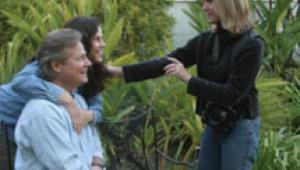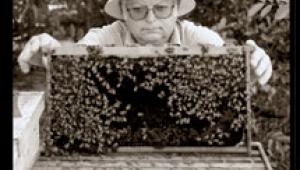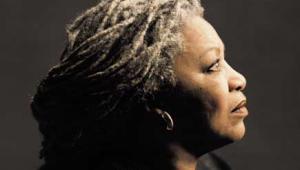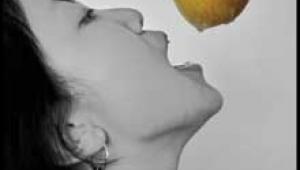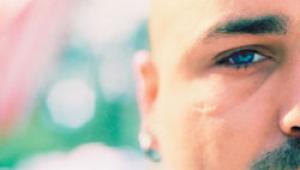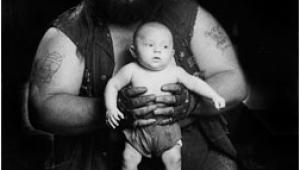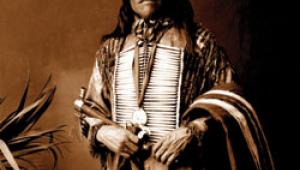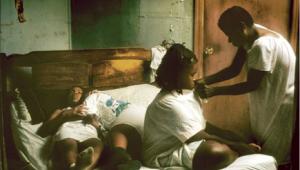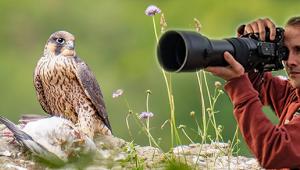A really nice piece of art indeed!
Lotte Jacobi's Historical Portraiture Page 2
Aesthetic Differences
Beginning in August, 1932, Jacobi spent six months traveling throughout the
Soviet Union and Central Asia. This excursion allowed her to do some travel
photography and to document the evolving Communist Republic. After Margaret
Bourke-White, Jacobi was the only female photographer ever to receive permission
to photograph the Soviet Union. Some of her images are credited to pseudonyms.
Jacobi returned to Berlin to find that the political climate was quickly changing.
The transfer of power to the Nazi party and her Jewish heritage made life dangerous
and work difficult to find, so she fled to America in 1935. Many of her images
were destroyed in World War II after she left Berlin. Jacobi moved to New York
City, where she opened a photography studio. To begin with, she had a difficult
time. She did some commercial photography, but her style wasn't always
compatible with U.S. magazines.
Berenice Abbott, an American photographer, befriended Jacobi and helped her
out. There was a small artists' community in New York, and they all banded
together. "Photography wasn't really accepted as a fine-art form
until later on," comments Sundstrom.
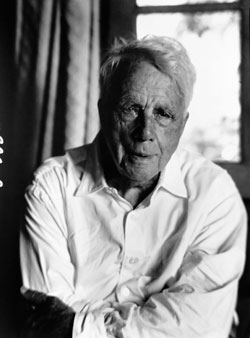 |
 |
||
|
|
From the late 1930s through the
'50s, Jacobi photographed such influential people as J.D. Salinger, Eleanor
Roosevelt, Erich Reiss (whom she eventually married), Alfred Stieglitz, and
Marc Chagall. She shot the portrait of Chagall and his daughter Ida at a time
when she experienced artistic differences after moving to New York. After seeing
her images, Chagall told Jacobi that he realized that photography could indeed
be a fine art form, as opposed to simple snapshots. For Jacobi, this was a rewarding
experience and renewed her confidence in how she viewed herself and her work.
As always, notes Sundstrom, "Jacobi allowed the person to be who he or
she was." In her 1938 "Portrait of Albert Einstein," the revered
physicist is pictured in his home and oblivious to the camera, wearing a leather
jacket. She managed to capture the human--not the genius--on film.
Although Life magazine had commissioned this assignment, they considered her
photos too "casual" for publication. "She was a very headstrong
person and didn't want to change her style to suit a magazine,"
Sundstrom points out.
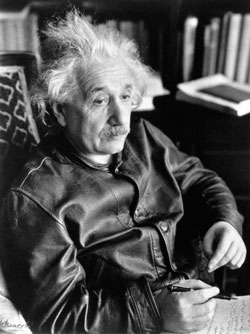 |
|
|
Exploring the Medium
She demonstrated that she could do photography with style and explore the artistic
aspects of the medium. Such was the case with her abstract expressionism that
incorporated photo materials (but no camera), known as "Photogenics."
Jacobi began creating these images in the late '40s at the suggestion
of a friend and fellow artist, Leo Katz (in addition to a new way to express
art, photogenics took her mind off her husband dying). In the darkroom, she
used a flashlight diffused by clear plastic or another sheer material to "paint"
light directly onto photographic paper. Each image was unique, such as "Sunset,"
which is included on these pages.
Jacobi's "Portrait of Leo Katz" was taken in 1938. In this
image, she utilized dramatic lighting and the cigarette as a prop, which she
rarely did, according to Sundstrom. "She didn't like to include
anything in her photos that detracted from the subject."
 |
|
|
From the City to the Countryside
In 1955, Jacobi left New York for the countryside in Deering, New Hampshire.
Her mother, husband, and a close friend had died within the span of a few years
in the early '50s. It was in New Hampshire that she began capturing closeups
and abstractions outdoors--"the unseen world of nature." Sundstrom
comments, "Jacobi never pigeon-holed herself. She did what she wanted
and didn't care what the critical press said. She basically made her money
at portrait photography, but she could do so much more."
In New England, she soon became involved with the local art community. She became
friends with writers Helen and Scott Nearing, May Sarton, and the poet Robert
Frost, all of whom she photographed. Initially, she was given about 15 minutes
to take Frost's picture, says Sundstrom, "but then they began talking
about gardening, and spent the afternoon drinking ginger beer." As usual,
she brought out the best in her subjects, even in Frost, who was considered
"kind of a curmudgeon."
 |
|
|
An Artist Remembered
Jacobi remained active throughout the late '60s and '70s. Sundstrom
says he's interviewed people who have had wonderful stories about her.
She always worked hard to promote photography as fine art, and "campaigned
to have photography represented in the annual New Hampshire Art Association
exhibition." She was also a delegate at the 1976 Democratic convention
for Jimmy Carter. She has also won many awards for her artistic achievements.
In 1980, the New Hampshire Governor's office (through the State Council
on the Arts) established The Lotte Jacobi Living Treasure Award, which honors
an artist who has made a significant contribution to his/her art form and to
the arts community, according to Sundstrom.
She died in 1990, but collections of Jacobi's work continue to be shown
regularly in Germany and the U.S. As Sundstrom says, "Her collection of
images are an important contribution to photography and the history of art."
- Log in or register to post comments

Im no expert, but I believe you just made an excellent point.
You certainly fully understand what youre speaking about, and I can truly get behind that.
cleaning services Chicago

It's really good written and I fully agree with You on main issue, btw. I must say that I really enjoyed reading all of Your posts. Kitchen remodeling San Diego

Hi there! I simply would like to give you a big thumbs up for the great information you've got right here on this post. I am returning to your site for more soon.
العاب بنات جديدة
العاب تلبيس البنات

Oh, this is a magical post. It’s life the most majestic post there is on this planet right now. This is really good work from your side. I strongly recommend you keep doing this kind of work.

Very good pictures and a topic that can never dissapear.
